|
|
|
Sort Order |
|
|
|
Items / Page
|
|
|
|
|
|
|
| Srl | Item |
| 1 |
ID:
174366
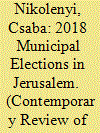

|
|
|
|
|
| Summary/Abstract |
This article analyzes the 2018 local elections in Jerusalem, the contested capital of the State of Israel. These elections were unique in terms of their level of competitiveness and fragmentation as well as producing a highly divided local government in the wake of the incumbent mayor’s, Nir Barkat’s, decision to leave the local political scene and enter national politics. While his party has no representation in city council, the new mayor of Jerusalem, Moshe Lion, built a broadly based new coalition that includes all parties in the council except for Hitorerut, the party that won the most seats and whose mayoral candidate, Ofer Berkovitch, was the runner-up to Lion. With the exception of the ultra-orthodox parties, national political parties that sought to interfere with the local electoral process to promote their candidates and lists by and large failed. Therefore, the governance of the city of Jerusalem once again fell under the control of the ultra-orthodox majority. Furthermore, even though the Arab population of East Jerusalem largely continued its traditional abstention from the electoral process, there was some evidence to suggest that a slight shift was taking place in that community in favor of participating in the institutional process of municipal government and democracy.
|
|
|
|
|
|
|
|
|
|
|
|
|
|
|
|
| 2 |
ID:
178537


|
|
|
|
|
| Summary/Abstract |
2019 marked the 25th anniversary of normalizing Jordanian-Israeli relations and the ‘warm’ peace-making between the two countries. Representing key partners and neighbours in the Middle East, Jordan and Israel have maintained political and economic ties since 1994. The pro-Western stance of both countries, and their common interest in maintaining regional stability, led Jordan and Israel to pursue similar foreign policy aims regarding various regional upheavals, as well as the Palestine-Israeli dispute. Jordanian-Israeli relations have, however, been caught amidst shifts in the US’s Middle East Policy under the Trump administration, which has raised questions over the status of Jerusalem and the West Bank. With respect to these developments, this article argues that the disaccord between the US/Israel and Jordan over these two places reveals that a politics of identity remains a pillar of the Kingdom’s stability and survival. Although both countries are being confronted with the same regional challenges, particularly in the wake of the war in Syria, the re-emergence of the rhetoric of ‘Jordan is Palestine’ – which poses the country as an alternative homeland for Palestinians (al-watan al-badil) – nowadays constitutes the top security concern for the Hashemite monarchy, and has the potential to undermine Jordanian-Israeli relations going forward.
|
|
|
|
|
|
|
|
|
|
|
|
|
|
|
|
| 3 |
ID:
036645
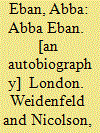

|
|
|
|
|
| Publication |
London, WeidenFeld and Nicolson, 1978.
|
| Description |
xii, 628p.Hbk
|
| Standard Number |
0297772708
|
|
|
|
|
|
|
|
|
|
|
|
Copies: C:1/I:0,R:0,Q:0
Circulation
| Accession# | Call# | Current Location | Status | Policy | Location |
| 017661 | 923.25694/EBA 017661 | Main | On Shelf | General | |
|
|
|
|
| 4 |
ID:
123032
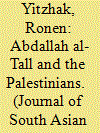

|
|
|
| 5 |
ID:
190993
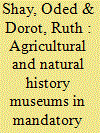

|
|
|
|
|
| Summary/Abstract |
The establishment of agricultural and natural history museums in Jerusalem (1920) and Tel Aviv (1925) by individual and institutional Jewish entrepreneurs was a corollary of the wave of exhibitions and fairs in Western countries that swept across Mandatory Palestine’s Jewish community (Yishuv) in the 1920s. Yet it also reflected Zionist ideals and perceptions and as such served as a catalyst for providing modern agricultural education to the Yishuv’s urban classes.
|
|
|
|
|
|
|
|
|
|
|
|
|
|
|
|
| 6 |
ID:
060212
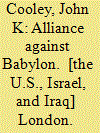

|
|
|
|
|
| Publication |
London, Pluto Press, 2005.
|
| Description |
xiv, 258p.Hbk
|
| Standard Number |
0745322824
|
|
|
|
|
|
|
|
|
|
|
|
Copies: C:1/I:0,R:0,Q:0
Circulation
| Accession# | Call# | Current Location | Status | Policy | Location |
| 049436 | 935.02/COO 049436 | Main | On Shelf | General | |
|
|
|
|
| 7 |
ID:
100536
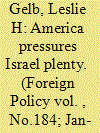

|
|
|
| 8 |
ID:
119459
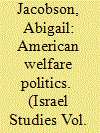

|
|
|
|
|
| Publication |
2013.
|
| Summary/Abstract |
This article discusses American involvement in Jerusalem during WW I, focusing on two American institutions active in the country and city at the time: the U.S. consulate and Consul Dr. Otis Glazebrook, and the American Colony in Jerusalem, an unofficial but important American institution. By examining these official and unofficial American "agents", this paper argues that the American involvement in the city can shed light on America's "welfare politics" in Palestine, whose traces can be tracked down until today. The "politics of welfare" offer many insights not only on war-time conditions in Jerusalem, but also provide a glance into American motivations of support and involvement in other areas in the Middle East. Using a variety of sources from the records of the American consulate and the American Colony, this paper analyzes the close connection between welfare, power, and political influence, demonstrated by the American case.
|
|
|
|
|
|
|
|
|
|
|
|
|
|
|
|
| 9 |
ID:
101444
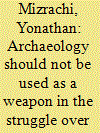

|
|
|
| 10 |
ID:
052725
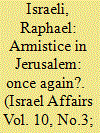

|
|
|
| 11 |
ID:
090915
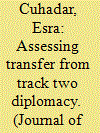

|
|
|
|
|
| Publication |
2009.
|
| Summary/Abstract |
This article focuses on the evaluation of transfer from Track Two diplomacy to negotiations and policymaking by examining four Track Two initiatives between Israelis and Palestinians over the issues of water and Jerusalem. The article first discusses the transfer process for the water and Jerusalem cases and then presents lessons drawn from the comparative study. The comparative assessment reveals similarities concerning transfer in terms of what the contributions of Track Two are to the process of negotiations, which transfer strategies are used, and what conditions are necessary to make a contribution to the outcome. Initiatives in both cases employ primarily the strategy of working with influential people and they are more successful in impacting the process of negotiations rather than the outcome. Their contribution to the process of negotiations shows regularities in the types of learning acquired and used. Successful transfer to outcome is observed in one occasion when transfer strategies were implemented effectively, the negotiators were open to outside information, and there was political willingness. Asymmetrical transfer of people, and of ideas, from Track Two initiatives to negotiations was a barrier to effective transfer.
|
|
|
|
|
|
|
|
|
|
|
|
|
|
|
|
| 12 |
ID:
154868
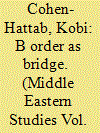

|
|
|
|
|
| Summary/Abstract |
Between 1948 and 1967, Jerusalem was divided by a ‘city line’, dividing Jordan (East Jerusalem) from Israel (West Jerusalem). Between the two sections stood one border crossing called ‘Mandelbaum Gate’. While existing literature on the Gate tends to emphasize its military status – owing in particular to the military convoy that crossed the border on a regular basis – research using sources from that time paints a picture of a border with civilian activity run jointly by two ostensibly warring countries. Whether it was the return of civilians and bodies, tourism coordination, or medical passage, those manning the border worked together to make it bridge, rather than barrier – and may even have paved the way to a peace agreement years later.
|
|
|
|
|
|
|
|
|
|
|
|
|
|
|
|
| 13 |
ID:
129803


|
|
|
|
|
| Publication |
2014.
|
| Summary/Abstract |
Looking primarily at the Israeli side of the conflict, one sees many factors that have contributed to the failure of past peace efforts, most of which may be present or repeated in current (2014) and possibly future - attempts at peace making.
|
|
|
|
|
|
|
|
|
|
|
|
|
|
|
|
| 14 |
ID:
102870
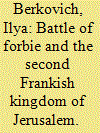

|
|
|
| 15 |
ID:
168047
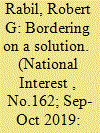

|
|
|
|
|
| Summary/Abstract |
AS THE Trump administration presses Arab countries to sign off on President Donald Trump’s Israeli-Palestinian “deal of the century” amid growing Arab polarization and vocal pessimism, little attention has been given to another sensitive regional matter that the administration has been aptly and quietly tackling. This matter revolves around the demarcation of the Lebanon-Israel maritime and land borders, which have been the focal point of skirmishes, a devastating war in 2006, and rising regional tension involving Iran and Israel.
|
|
|
|
|
|
|
|
|
|
|
|
|
|
|
|
| 16 |
ID:
126898
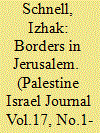

|
|
|
|
|
| Publication |
2011.
|
| Summary/Abstract |
Borders may be understood as one of the basic elements that constitute territories. Territories are homogeneous bounded spaces that are associated with the existence of species and control over space. Borders are the lines the demarcate and limit territorial expanses. The systematic study of territorial control and boundaries is common in geographical studies, mainly in the study of national borders.
|
|
|
|
|
|
|
|
|
|
|
|
|
|
|
|
| 17 |
ID:
177684
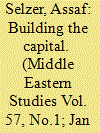

|
|
|
|
|
| Summary/Abstract |
The Declaration of Independence of the State of Israel makes no mention of the country’s aspirations regarding its borders; neither does it mention the name of the state’s capital. The absence of these features was due to the state of war that the country faced at the time of the declaration, as well as the fact that according to the Partition Plan (UN Resolution 181), Jerusalem was supposed to come under international control. This article discusses Israel’s actions in the area of Jerusalem under its control. In December 1949, it was officially decided to transfer the institutions of government to Jerusalem. The state institutions were initially scattered around the city, but a government compound began to be developed later. The article will focus on the development of this compound, presenting the decisions that were implemented in order to turn it into a capital within a city.
|
|
|
|
|
|
|
|
|
|
|
|
|
|
|
|
| 18 |
ID:
192287
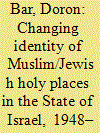

|
|
|
|
|
| Summary/Abstract |
Over the past seven decades, dozens of Muslim holy places in Israel have undergone a process of Judaization, becoming an integral part of the Israeli-Jewish sacred landscape. The current paper compares three waves of Judaization that followed the 1948 and 1967 wars, emphasizing the institutional and popular character of this process. The appropriation of Muslim holy places and their conversion is tied to the political, social, and religious changes that Israeli society underwent during its seventy years of existence. During these decades, Jewish holy spaces gained social, cultural, and religious importance; visiting them became a popular pastime. As the demand for holy places grew, former Muslim sites were converted and became part of Jewish sacred space. The process of transformation took place in parallel on two planes – the institutional and the popular – as both Israeli governmental bodies and worshipers converted Muslim holy places into Jewish sacred sites. The outcome of the process was the expansion of sacred space in the State of Israel and the inclusion of the periphery, which in many cases contained former Muslim holy places, as an integral part of the Jewish map of holy places.
|
|
|
|
|
|
|
|
|
|
|
|
|
|
|
|
| 19 |
ID:
077263
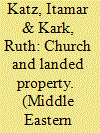

|
|
|
| 20 |
ID:
126636
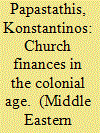

|
|
|
|
|
| Publication |
2013.
|
| Summary/Abstract |
The British Mandatory government established in 1921 a commission in order to control the finances and the vast landed property of the Orthodox Patriarchate of Jerusalem. This paper sketches out the commission's early activity, arguing that its significant powers and its operation at the expense of the clerical apparatus were not so much grounded on the need to facilitate the recovery of the historic church, but were in fact determined by the socio-political developments, at a local and international level, as well as by the necessity to strengthen the British authority in Palestine during a fluid period for public order.
|
|
|
|
|
|
|
|
|
|
|
|
|
|
|
|
|
|
|
|
|